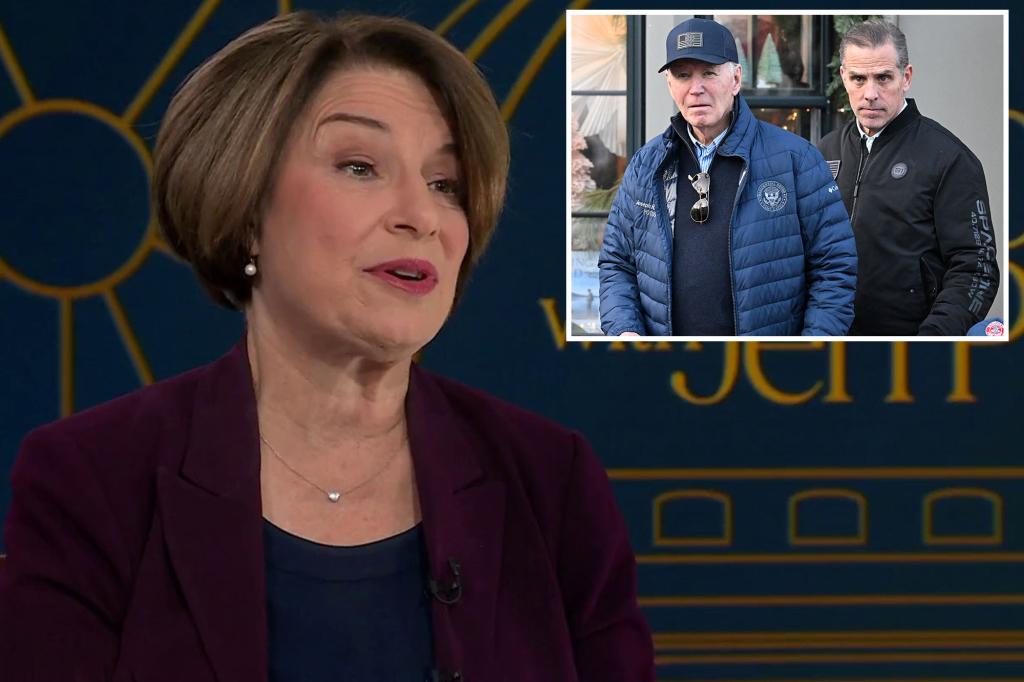Senator Amy Klobuchar has called for pardon reform in the wake of President Biden’s controversial decision to grant a sweeping clemency to his son, Hunter Biden, and amidst reports that the president is considering preemptive pardons for several key allies. Klobuchar’s concerns stem from the broad nature of Hunter Biden’s pardon, which covers potential offenses committed between 2014 and 2024, a period encompassing Hunter’s lucrative business dealings in Ukraine and China, dealings that have drawn significant scrutiny. The senator argued for a more structured approach to presidential pardons, suggesting the establishment of a review committee or board to provide recommendations, thus limiting the potential for perceived favoritism or abuse of power. She expressed her disapproval of both the pardon of Hunter Biden and the potential preemptive pardons, arguing that such actions undermine the principle of equal justice under the law.
The breadth of Hunter Biden’s pardon has raised eyebrows because it effectively shields him from prosecution for any potential crimes committed during a decade that includes his controversial involvement with foreign companies. This period coincided with Joe Biden’s vice presidency, raising questions about potential conflicts of interest and influence peddling, although no formal charges related to these matters have been filed against Hunter Biden. The White House has maintained that the president “wrestled” with the decision to pardon his son, attributing the final decision to the urging of Representative Jim Clyburn, a prominent Democrat. This explanation, however, has done little to quell the criticism, particularly given the president’s previous assurances that he would not interfere in the justice system regarding his son’s legal troubles.
Adding to the controversy is the report that President Biden is considering preemptive pardons for several individuals, including Senator-elect Adam Schiff, retired General Mark Milley, and former White House chief medical advisor Anthony Fauci. These potential pardons are reportedly being considered as a protective measure against potential politically motivated prosecutions by a future Trump administration. This preemptive approach is highly unusual, as presidential pardons typically address specific crimes for which individuals have already been charged or convicted. The possibility of preemptive pardons raises concerns about potential abuse of the presidential pardon power and the erosion of public trust in the justice system.
Klobuchar’s call for pardon reform aligns with the concerns expressed by other critics who argue that the current system grants excessive power to the president, potentially allowing for politically motivated decisions that circumvent the normal judicial process. The preemptive nature of the pardons under consideration further complicates the matter, blurring the lines between legitimate use of the pardon power and potential obstruction of justice. Even some of the individuals reportedly being considered for preemptive pardons, such as Adam Schiff, have publicly stated they do not want or need such a pardon, reaffirming their faith in the legal system and their belief in facing any potential charges through the established judicial processes.
The timing of these pardon considerations, occurring in the context of ongoing investigations and potential prosecutions related to the January 6th Capitol attack and other politically charged matters, further fuels the debate surrounding the appropriate use of presidential pardons. Critics argue that preemptive pardons could be interpreted as an attempt to shield individuals from accountability for potential wrongdoing, undermining the principle of equal justice under the law. Furthermore, the perceived politicization of the pardon process risks further eroding public trust in both the executive branch and the justice system as a whole.
The controversy surrounding Hunter Biden’s pardon and the potential preemptive pardons underscores the need for a broader discussion about the scope and limitations of presidential pardon power. The current system, critics argue, lacks sufficient checks and balances, creating opportunities for abuse and undermining the principle of equal justice under the law. Senator Klobuchar’s call for reform echoes a growing sentiment that a more structured and transparent process is needed to ensure that presidential pardons are used judiciously and in a manner consistent with the principles of fairness and accountability. Whether such reforms can be achieved in the current political climate remains uncertain, but the ongoing debate highlights the crucial importance of upholding the integrity of the justice system and safeguarding public trust in the rule of law.










